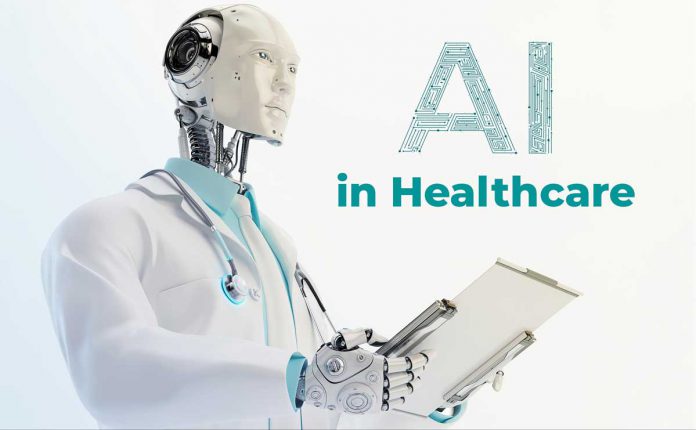- AI Overview
- What Is Artificial Intelligence (AI)?
- Machine Learning VS Deep Learning
- What are the benefits of artificial intelligence (AI)?
- AI in the healthcare industry
- Most popular applications of AI in the healthcare industry
- Challenges of AI in Healthcare
- Conclusion
AI Overview
AI is the buzz keyword of the upcoming decade which will revolutionize every aspect of life, we can see nowadays a lot of its applications like SIRI, CORTANA, autonomous cars, and robots, …etc.
All applications of AI is meant to make human life easier and better, despite the fact that artificial intelligence invokes fear and most of us, it is benefiting us in numerous ways, applications of AI this time is still on a narrow scope that includes simple tasks, but in the future, AI will be stronger at all cognitive tasks.
AI in healthcare is revolutionizing the medical industry by providing a helping hand in the age of pandemics. We’ll elaborate more about AI and the different ways in which artificial intelligence is impacting the healthcare domain so let us begin by discussing the main points we are going to discuss in this vital topic.
What is artificial intelligence (AI)?
To understand what exactly is artificial intelligence in a simple way, artificial intelligence is the development of computer systems that are capable of performing tasks that normally require human intelligence, tasks such as decision making, object detection, solving complex problems, and so.
Machine Learning VS Deep Learning
Now let’s move on and understand two of the most important concepts in artificial intelligence which are machine learning and deep learning, we will try to define it a simple way to differentiate between them as many people don’t know what exactly the difference is.
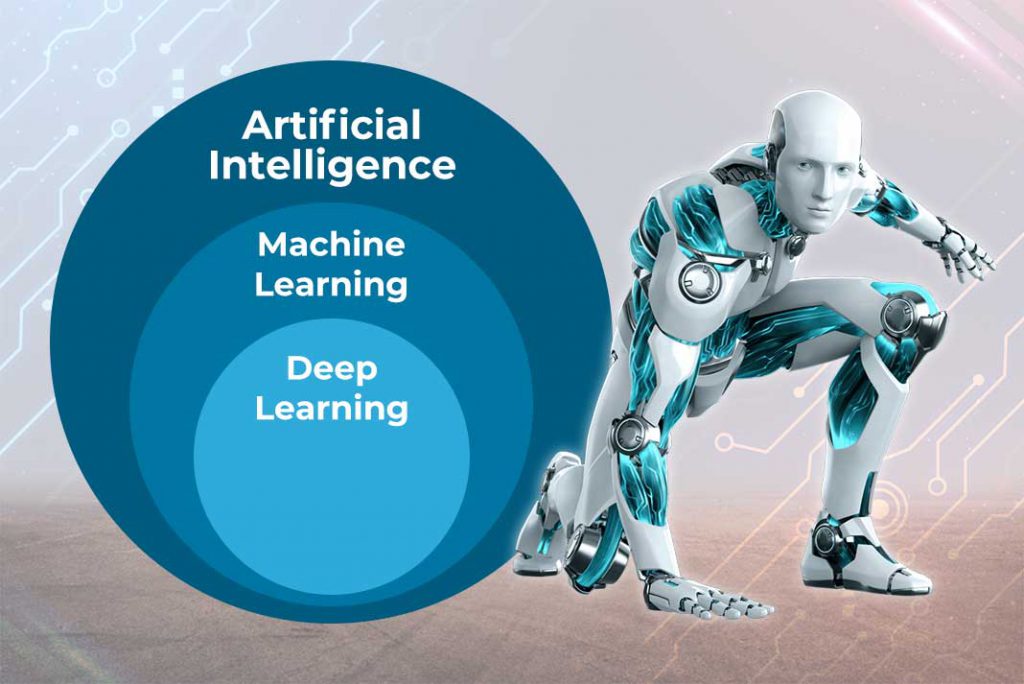
Machine Learning
Machine learning is a subset of artificial intelligence, which provides machines the ability to learn automatically and improve from experience without being explicitly programmed to do so.
in simple terms add value machine learning is the process of filling machines with lots and lots of data so that they can interpret process and analyze data in order to produce any actionable insights that benefit an organization.
So, the main thing in machine learning is you’re going to take lots and lots of data and feed it to your machine, and your machine is going to try, understand, and interpret this data by using machine learning models and machine learning algorithms. It’s finally going to solve a problem or predict an outcome based on that data so that’s what machine learning is.
Deep Learning
Now let’s understand what exactly deep learning is because deep learning is a more advanced concept of machine learning.
Basically, deep learning is a more advanced field of machine learning that uses the concept of neural networks in order to solve more complex problems that require high dimensional data and automated feature extraction.
You can see that deep learning is used to solve more complex and higher-dimensional data problems, the main thing about deep learning is it makes use of neural networks in order to map your input and your output as outlined in the below image.
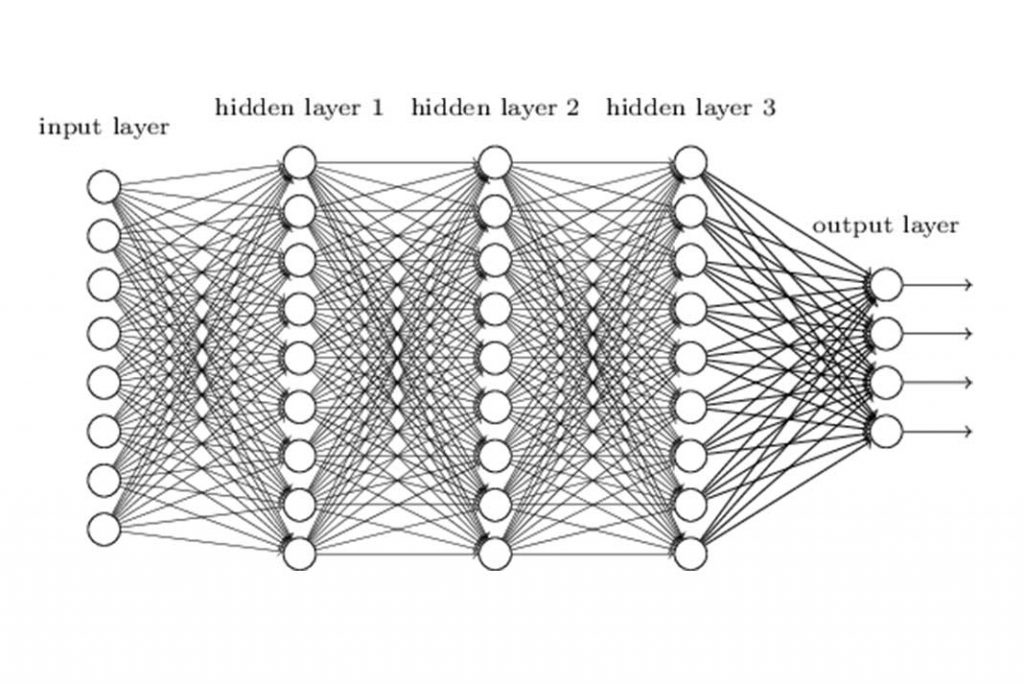
In order to solve a problem in deep learning, you make use of neural networks or artificial neural networks to be more precise.
The neural networks in a nutshell are what the human brain is formed of. Scientists basically replicated our brain in the form of artificial neural networks or also deep learning.
So basically, artificial neural networks function precisely how the human brain functions, think when you are given a lot of input data and this data is then transformed, you apply weights and biases and make the data go through multiple transformations and correlations in order to result in precise output.
What Are the Benefits of Artificial Intelligence (AI)?
Better quality and precision
The possibility of human errors is relatively variable due to the continuous change of human physical, emotional, and mental status. So the high performance and proper decisions of humans even if they are very skilled, are not guaranteed all the time.
In AI, decisions and actions are made according to previously collected datasets and applying specific algorithms on them in a consistent way that minimizes the potential of error in the process every time. With more learning the AI becomes more accurate and always developing, many applications of AI help humans minimize the potential errors.
AI saves time
Using artificial intelligence can help to make faster decisions than humans, it can solve complex problems and performs high-level computations that will take days for a human to solve, it doesn’t take a lot of thinking and spending much time in analysis, it executes exactly what they are requested to do without consideration of all human factors.
Also, AI is capable of doing routine and repetitive tasks that can take much time, it would save Human’s time spent on regular tasks and make them available to the necessary tasks that require human intervention.
AI is working all day long without breaks or vacations
One of the fantastic features of AI, it doesn’t have stamina or working hours, humans are working for a specific period of the day and they have vacations and holidays, which is not the case of AI.
AI can work continuously without interruption or breaks 24/7, it can perform tasks all day long that increase productivity and efficiency as well.
AI keeps human safety
AI is now capable to take risky tasks which humans cannot take; it’s considered one of the most important benefits of AI to replace human by robots in the risky work.
This can be more apparent in the space industry or deep ocean exploration where humans cannot go.
AI in healthcare Industry
Overview
Now let’s move on and discuss artificial intelligence in the healthcare domain, as the introduction of artificial intelligence in the 1950s it has been impacting various domains including marketing, finance, the gaming industry, and even the musical arts.
However, the largest impact of artificial intelligence has been in the field of healthcare. A published report from PWC mentioned that artificial intelligence is going to add an additional USD 15.7 trillion to the world economy by 2030, healthcare field will be one of the most that will witness transformation through AI technology.

So, we know that healthcare is getting more important or is using artificial intelligence in a more advanced manner and it’s getting trendy over time as shown in google trends image, now what has led to the sudden importance of AI in the healthcare industry, what do you think is a reason behind the sudden growth of artificial intelligence in the healthcare industry?
Why AI Has High Potential in Healthcare Industry?
Let us narrow it down for you, there are two major points of which have made AI so impactful in the field of healthcare.
Healthcare Is a Data Rich Industry
The first reason is the high availability of medical data, now all of us have tons and tons of medical data in the form of medical history, whenever we go to any hospitals our history is written down in accounts so basically with the availability of data implementing artificial intelligence becomes much easier.
The AI is based on technologies such as deep learning and machine learning which require tons and tons of data, so with the availability of data it became easier to implement or it became easier to use artificial intelligence In the healthcare industry.
Variability and Complexity of Healthcare Data
Another important reason that led to the development of AI in healthcare is the introduction of complex algorithms, machine learning is not capable of handling high dimensional data, and particularly the medical data that we have, or healthcare data that we have is of very high dimension in character, the data is very vast, there are thousands and thousands of attributes.
Now for us in order to process and analyze data of this dimension is hard to do with machine learning, but as soon as deep learning and neural networks were introduced this became much easier because deep learning and neural networks basically focus on solving complex problems that involve high dimensional data.
So the development of deep learning and neural networks also played a major role in the impact of AI in healthcare, so I hope you understood why artificial intelligence is impacting the healthcare industry in such a huge way.
Most Popular Applications of AI in Healthcare Industry
AI in Medical Imaging
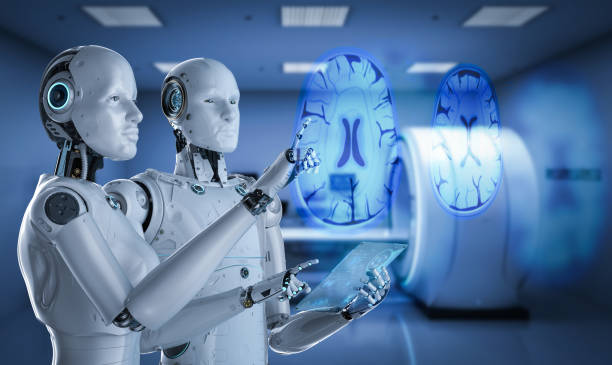
One of the most powerful applications of artificial intelligence in medical diagnosis now is in medical imaging and diagnosis powered by AI because of the huge digital data produced by imaging modalities.
Also, the shortage of radiologists and the rising imaging technology caused increased workloads and delays in reporting, which pushed forward the need for new technology to support radiologists and empower them.
With the help of convolutional neural networks and machine learning algorithms, the AI-powered PACS system can read medical images of several types like X-Ray, Mammograms, CT scans, and MRI scans. AI is trained on a large number of datasets to detect lesions, other abnormalities in images and differentiate between normal findings and other abnormal scans.
AI is capable of recognizing medical images and detecting multiple diseases with precision, it can detect even the smallest abnormalities in images that the normal eye cannot detect.
AI has shown good accuracy in diagnosing images to give a primary opinion to the radiologist that needs to be verified, it’s not considered a replacement for radiologists but it can empower them, streamline their workflow, and prioritize studies to check the critical conditions first.
Early Detection of Diseases and Critical Events
Now let’s understand how artificial intelligence has helped in detecting diseases at an earlier stage, actually artificial intelligence has played a very important role in the early predictions of medical condition such as heart attacks.
There are many AI-based wearable health trackers that are being developed to monitor the health of a person and display any warnings when the device captures something unusual or something unlikely.
Examples of such variables include Fitbit, Apple Watch, and many others now like this a precaution is always better than cure I think this was a motto behind the latest release of the Apple watch.
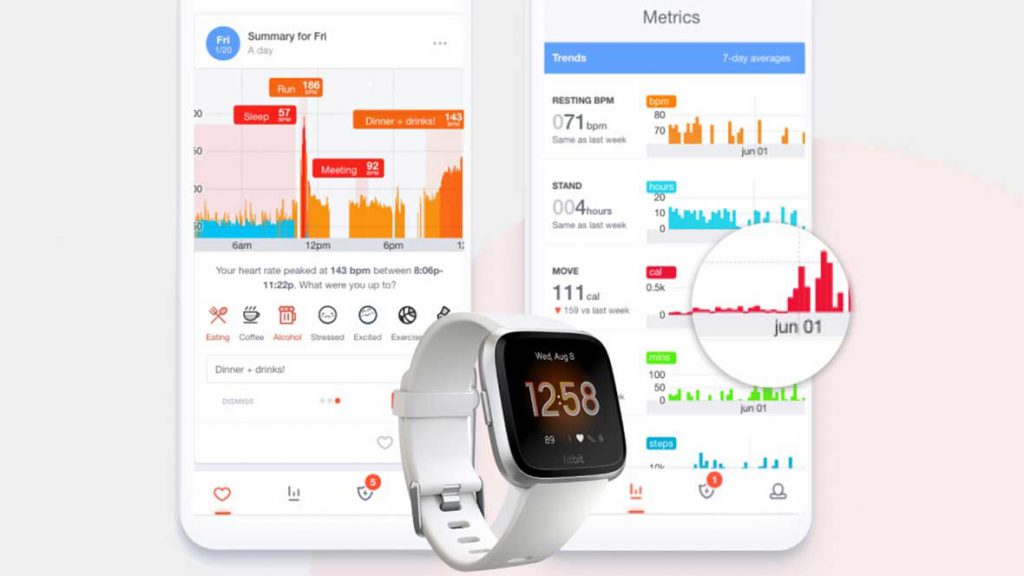
Apple used artificial intelligence in order to build a watch that monitors an individual’s health, this watch will basically collect data like the person’s heart rate, sleep cycles, breathing rate, activity level, blood pressure, and so on.
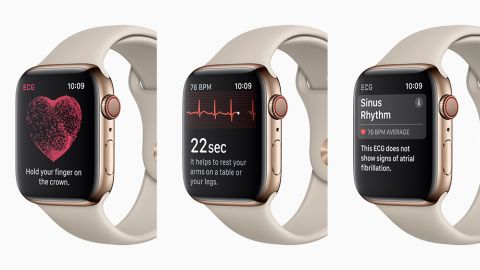
It keeps a record of all of these measures 24/7, so all you’ve to do is you have to wear the watch and all of this data is automatically collected by the watch.
So now that you’ve collected data you know the next step in machine learning is processing, analyzing, and making predictions from data.
This collected data is processed and it’s analyzed using machine learning and deep learning algorithms so that you can build a model that predicts the risk of a heart attack.
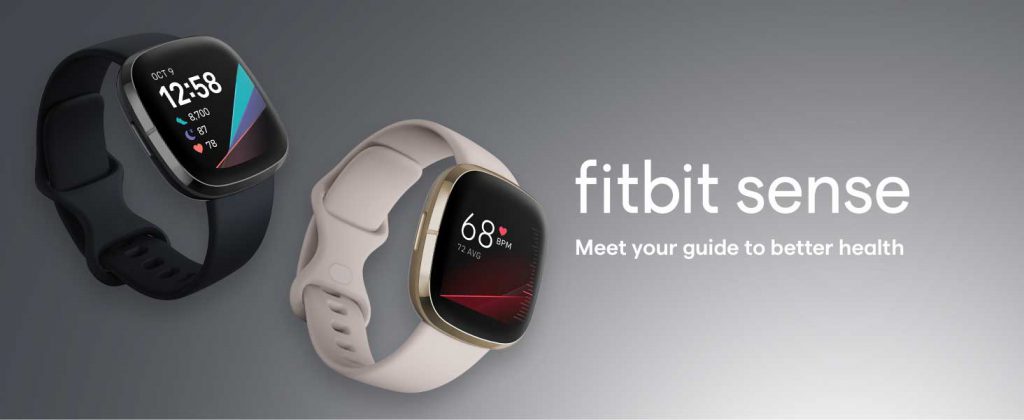
With the help of data, you’re going to predict whether a person has chances of getting a heart attack or not.
AI in Pharmaceutical Sector
For many years, the pharmaceutical industry is dependent on using the latest technologies that would help in the delivery of the best drug formula to be safe and efficient.
Artificial intelligence with machine learning is providing unlimited opportunities in transforming the business within the pharmaceutical industry right now.
Pharmaceutical industry is now making a good use of artificial intelligence in many functions starting with drug discovery and clinical trials till the manufacturing process and marketing.
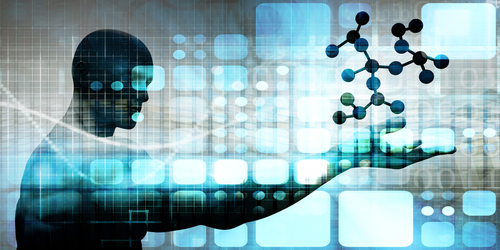
In the field of R&D and drug design, AI helps in identifying complex patterns in diseases and its behavior, so it can recognize which chemical composition that can be effective in treatment of a specific disease.
Before AI, R&D was costly and takes much time, in a research for MIT, only 13.8% of tested drugs in clinical trials pass with successful results.
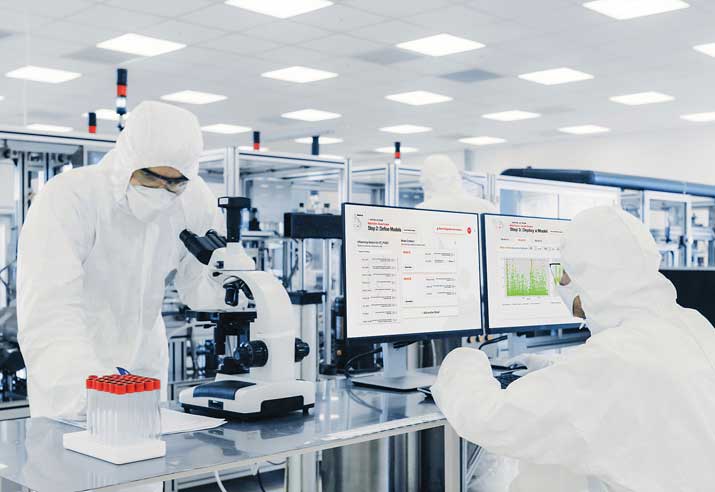
AI can improve success rates in clinical trials and helps in lowering the cost of innovating new drugs, which interprets why AI is rapidly adopted in the pharmaceutical industry.
In the field of clinical trials, It helps in identifying the best candidates for clinical trials, based on a large number of patients with a specific condition. It can scan all patient history and the disease stage for every patient in addition to other parameters and make a decision for choosing the right patients.
Precision medicine and presenting personalized care that requires a personalized medication for every patient, that depends on the severity and the biological variation in each case.
In the manufacturing process, Ai can improve productivity and efficiency by replacing the conventional manufacturing techniques with enhanced techniques that positively affect quality control, waste reduction, and preventive maintenance.
AI in Virtual Medical Assistant
Now, let’s move on and understand how artificial intelligence is used as a virtual medical assistant (VMA) for healthcare providers.
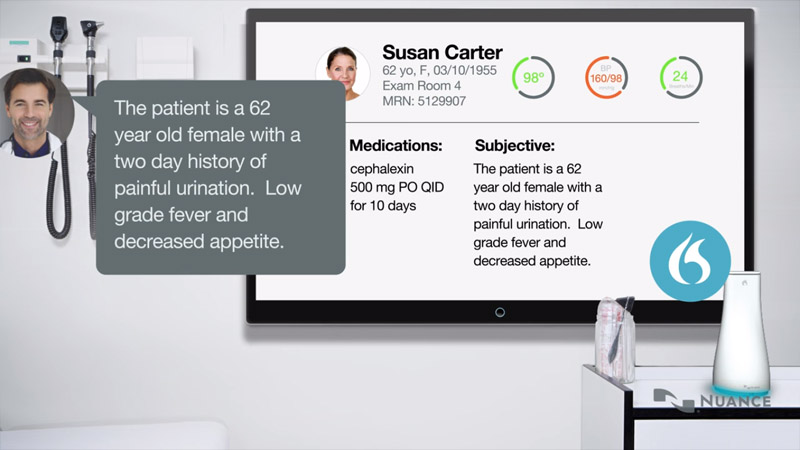
This is a new innovation of AI in healthcare to help physicians alleviate the daily pressure of workflow, as care practitioners are suffering from burnout because of the increasing number of patients and high workloads.
The increasing number of aging populations with chronic conditions and the shortage of professionals urged the importance to find a solution that helps physicians and care providers to skip the daily routine work.
AI contributed to developing machine learning powered solutions like a transcription of conversations between physicians and patients without the need to manually record information, this VMA can provide a fully transcribed conversation with clinical notes that only needs a revision and signature from a doctor then it can be integrated to the electronic health records of the patient.
For radiologists, it helps radiologists to streamline their workflow and accelerate the diagnostic reporting of images by converting their voice and unstructured data into a well-formatted and structured report that would save much time for them.
AI in Clinical Decision Support Systems (CDSS)
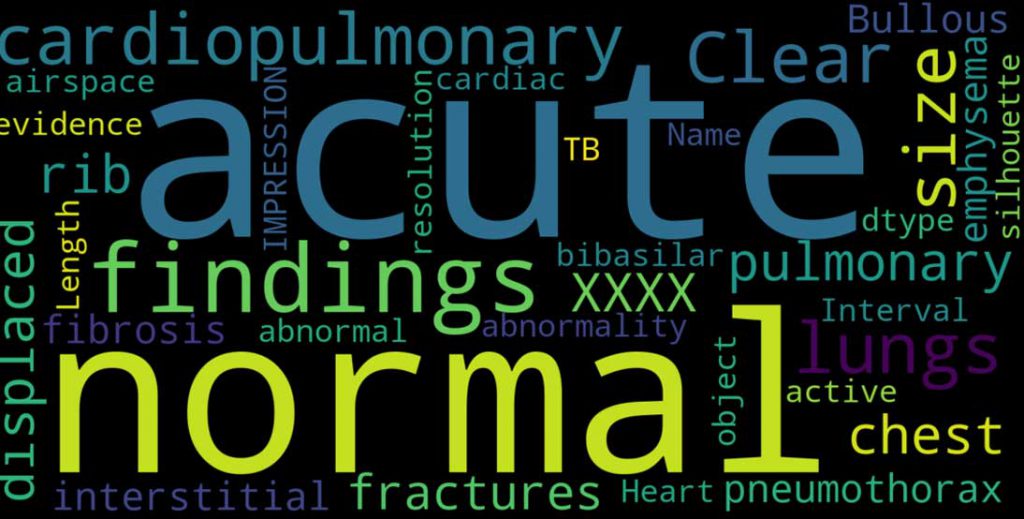
Now let’s move on and discuss artificial intelligence in decision-making, AI has played a very important role in decision making not only in the field of healthcare, but AI has also improved businesses by studying customer needs and evaluating any potential risk that a business might face.
The clinical decision support system is the product of combining big data with artificial intelligence, the rapidly growing medical data generated from electronic health records, medical wearables, sensors, and medical devices created a lot of variables that we might make good use of.
CDSS depends on gathering a huge amount of data from a patient, it can compare the patient history, the current status, and the newly entered data to suggest a treatment plan or give recommendations for the best practice and better care pathways, it analyzes patient data against a lot of other patients’ data having the same situation or symptoms and give decisions about potential diseases or possible future complications.
CDSS enabled clinicians in defining risks, better diagnostic ability, and make more precise decisions regarding patient status, it will continue evolving with time and provide more enhanced capabilities.
AI in Virtual Nursing and Symptoms Assessment
Innovative applications of AI in healthcare is extending to personal health check, we have started to see mobile apps and websites that allow people to check their health status or they want to get a pre-diagnostic assessment to their symptoms before they visit a hospital or a clinic.
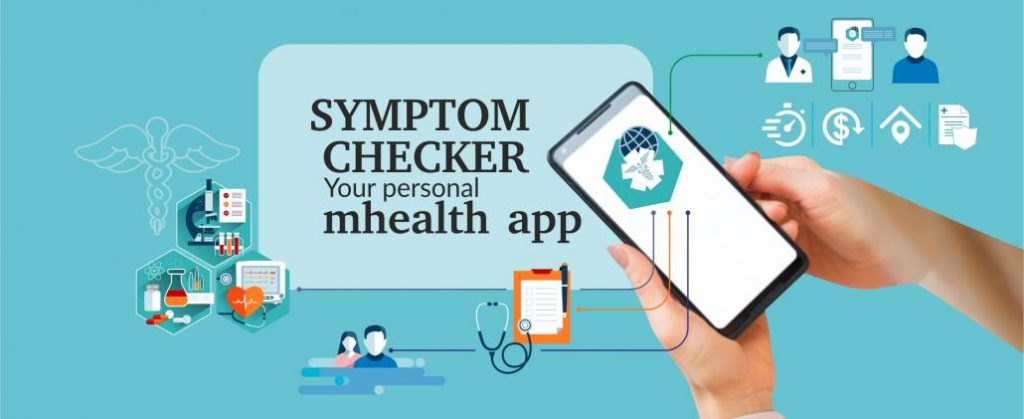
Applications like Symptom Checker help people to enter data of their symptoms through chatbots to discover what would be the cause of these symptoms, for sure it’s not a replacement for a doctor but this can decrease the burden on medical staff and can give a primary vision of the case that needs further assessment by the doctor. This would be beneficial also in providing healthcare professionals a primary report about the case especially when using telehealth consultations to save physicians time and make them focused to drive better productivity.
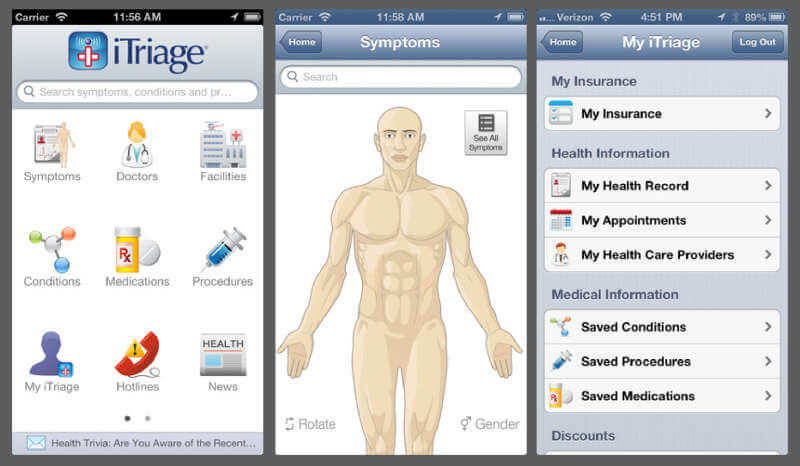
This tool can provide medical triage to let patients know how severe their case is by classifying their cases according to multiple categories like life-threatening, priority, or non-urgent case that needs ordinary treatment and care pathway.
One of the most recent applications of this tool is providing a Covid-19 symptoms checker that allows the patient to check their symptoms if it’s potential to be Covid or not, the good thing about it is its availability 24/7 and it can give patients some guidance and recommendations regarding their condition and what is the most suitable care pathway for them.
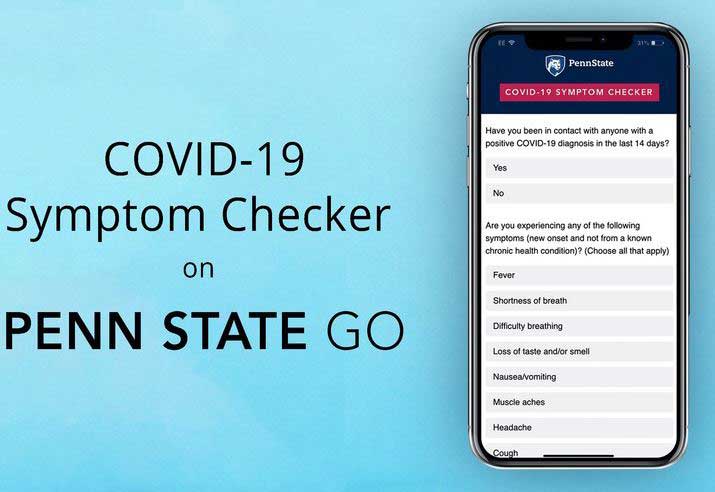
A virtual nurse is basically a nurse, but it’s not physically present, it provides clinical advice to you whether you should take this medicine or not, it does also helps in scheduling appointments for you so essentially it helps in self-care.
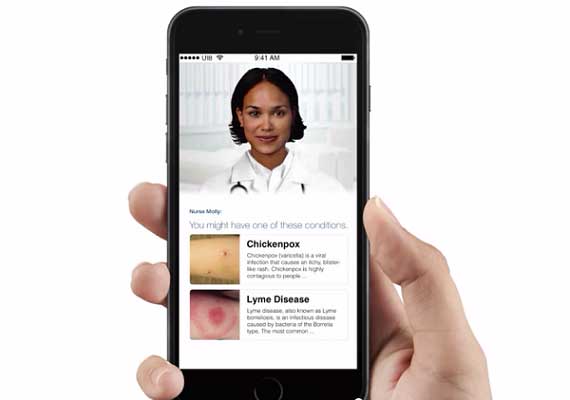
a virtual nurse is implementing natural language processing speech recognition, machine learning, and wireless integration with medical devices such as blood pressure cuffs in order to provide medical assistance to patients.
It is basically a virtual nurse for you and it helps you with your medication, it tells you, using AI voice, when exactly you should take your medication and whether or not you should eat a certain food.
Other software solutions are available for healthcare professionals that were mentioned in the clinical decision support point, and it’s also considered as one of the assessment tools but only to be used by professionals for better differential diagnosis and decision making.
AI in Remote Patient Monitoring
Rather than using the traditional web-based remote patient monitoring solutions that need the physician’s review for each patient and set the priority of care manually, AI presents a better solution for physicians.
AI can help improve patient outcomes, support physicians in remote patient monitoring, and save their time to give attention to patients who truly need their care.
Medical wearables and sensors can measure and monitor patient vital signs and other medical data automatically then analyze this data, AI can send recommendations to doctors based on data analysis for patients who need to be checked.
Applying this technology helps a lot in reducing the cost of care and unnecessary readmissions by patients especially with the growing aging population.
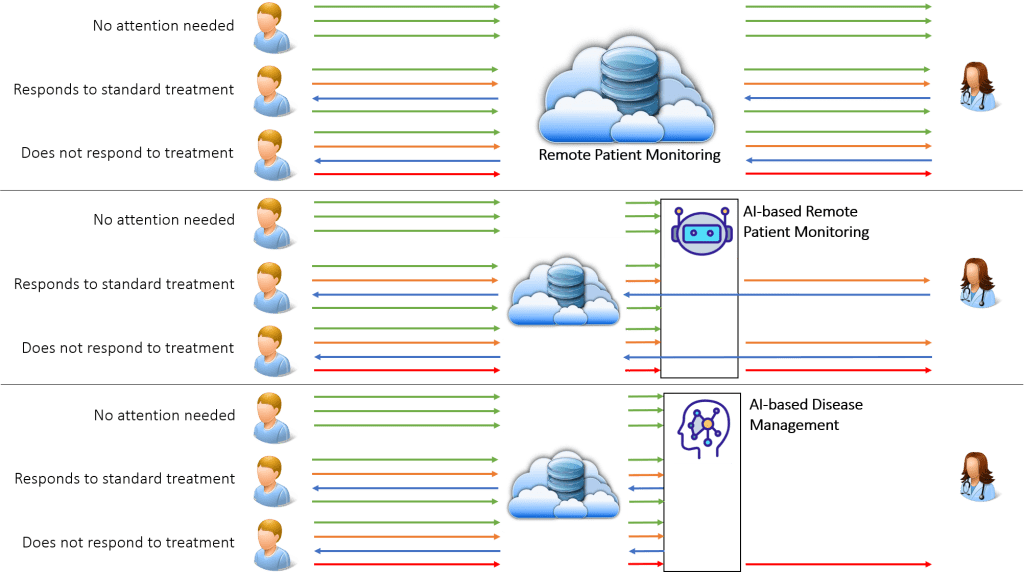
Challenges of AI in Healthcare Industry
Although AI has enormous benefits for healthcare as discussed in the past points, its adoption is not advancing rapidly and it’s facing some challenges that might hinder this process, we need to overcome these challenges to help in enabling this technology and be used efficiently.
- Fear of replacing human clinicians and professionals.
- The capability of technology to develop useful applications.
- Approvals and regulations.
- Interoperability with other technologies.
- Quality standardization across all suppliers.
- Training of staff and qualifying resources.
- pricing of products and services.
- Accessibility to public and private sectors.
These are highlights about the potential challenges that might face AI in healthcare and slowdown its adoption and dispersion, we might discuss these challenges in detail later in another article, we know this article might be a fatty meal in AI for a lot of us.
Conclusion
Artificial intelligence is referred to as intelligence demonstrated by machines, in other words, AI is the development of computer systems that can perform tasks that normally require human intelligence.
AI technology has a huge potential for transforming healthcare in a big way, applicable in multiple contexts including healthcare professionals as well as healthcare consumers by providing valuable tools to improve patient care develop precision medicine. AI is becoming more sophisticated at doing what humans do but at a faster rate, with more accuracy, more efficiency, and at a lower price.
AI processes the data and learns from the patterns in the data through machine learning and deep learning algorithms, and based on those learnings can make predictions about future events.
AI will make a massive impact on healthcare in the near future, AI is already reshaping healthcare in multiple areas such as management of patient’s electronic health records, early disease detection, diagnostic imaging, drug development, clinical trials, virtual nursing, surgical robots, and clinical decision support systems.
Artificial intelligence has a huge potential for improving the process of diagnosing diseases, AI techniques such as neural networks, decision trees, and many more can be used to successfully diagnose many diseases.
Deep learning algorithms can perform just as well as human healthcare professional for some diagnostic applications, robots can be used to automate some of the laboratory work that is used in medical facilities, robots can help in physical therapy to help patients recover faster, robotic surgery is helping doctors perform complex procedures with greater precision and less risk.
By using deep learning researchers will be able to feed incredible amounts of data that can then be analyzed to find new treatments or recognize trends, with existing drugs AI can significantly cut down both the cost and the time it takes to reach the market.
Medical wearable devices can provide continuous tracking of patient’s health through vital signs and notice changes that might predict the incidence of a critical situation.
Personal health assessment apps based on AI are getting noticed worldwide and it’s used widely in the Covid-19 pandemic to assess the potential of infection or even the severity of a case.
We should get ready with a new mindset to accommodate all AI healthcare applications that will transform our lives in the current decade.
Collaborate with us in comments and let us know your expectations about AI in healthcare and how it can perform better in healthcare management and development, if you have your own experience regarding AI in healthcare please submit your content to HBC as it will be a good way to share your experience.

